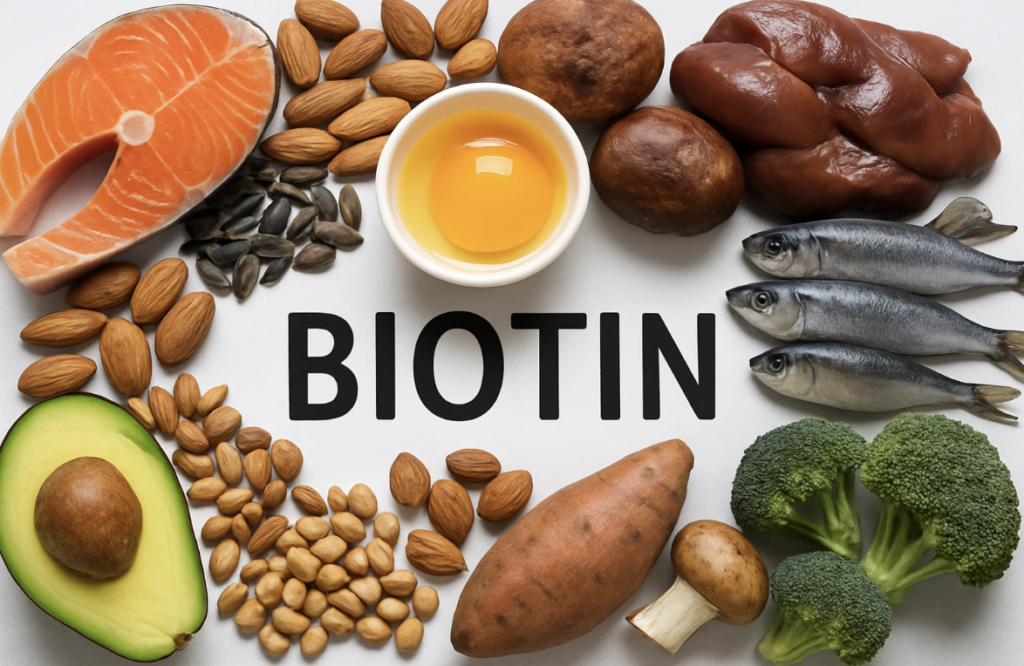Biotin, also known as vitamin B7, is a water-soluble B vitamin best known for its role in supporting healthy hair, skin, and nails. But biotin’s benefits extend far beyond beauty—it’s crucial for energy production, metabolism, and nervous system function. In this guide, you’ll discover what biotin does, signs of deficiency, food sources, and whether supplementation is worth considering.
What Is Biotin and What Does It Do?

Biotin is involved in converting food (carbs, fats, and proteins) into usable energy. It’s a coenzyme for several metabolic enzymes and also supports gene expression and cell signaling.
✔ Key Functions of Biotin:
- Supports healthy skin, hair, and nails
- Helps convert macronutrients into energy
- Aids in the metabolism of fatty acids and amino acids
- Supports nervous system function
- Plays a role in prenatal development and fetal growth
💡 Did You Know? The name “biotin” comes from the Greek word biotos, meaning “life” or “sustenance.”
Top Health Benefits of Biotin

✔ 1. Strengthens Hair and Nails
Biotin is often used to help reduce hair thinning, promote shine, and prevent brittle nails.
✔ 2. Improves Skin Health
Biotin supports the health of skin cells, and deficiency may lead to rashes or dry, scaly skin.
✔ 3. Boosts Energy and Metabolism
Helps break down carbohydrates, fats, and proteins for fuel.
✔ 4. Supports Nervous System Health
Biotin is important for neurotransmitter activity and myelin formation (nerve sheath protection).
✔ 5. Essential for Pregnancy and Fetal Growth
Supports normal embryonic development and is commonly included in prenatal vitamins.
Signs of Biotin Deficiency

⚠️ Common Symptoms:
- Thinning hair or hair loss
- Brittle nails or skin rashes (especially around eyes, nose, and mouth)
- Fatigue or low energy
- Muscle pain or cramps
- Numbness or tingling in hands and feet
- Mood changes or brain fog
💡 At-Risk Groups:
- Pregnant women
- People with chronic alcohol use
- Individuals on long-term antibiotics or anti-seizure meds
- Those with digestive conditions (e.g., Crohn’s, IBS)
Top Food Sources of Biotin

🍳 Biotin-Rich Foods:
- Egg yolks (avoid raw egg whites—they contain avidin, which blocks biotin absorption)
- Liver and organ meats
- Almonds, walnuts, and peanuts
- Sunflower seeds
- Salmon and sardines
- Sweet potatoes
- Mushrooms, spinach, and broccoli
💡 Tip: Biotin is water-soluble and not stored in large amounts—include biotin-rich foods daily.
Recommended Daily Intake (RDI)
- Adults: 30 mcg/day
- Pregnant women: 30 mcg/day
- Breastfeeding women: 35 mcg/day
- Higher amounts are often used in supplements (5,000–10,000 mcg) for hair/skin support, but these are not medically required for everyone.
Biotin Supplement Considerations
💊 Popular Forms:
- Capsules, tablets, and gummies
- Often combined with other B vitamins or collagen
⚠️ Supplement Tips:
- Very high doses can interfere with lab tests (thyroid, cardiac troponin, etc.)
- Always inform your doctor before testing if you’re taking biotin
💡 Best Practice: Start with food-first approach unless your doctor recommends high-dose supplementation.
Pros and Cons of Biotin
✔ Pros:
- Supports beauty and energy from within
- Safe and well-tolerated in moderate doses
- Helpful during pregnancy and postpartum
⚠️ Cons:
- High doses may distort lab results
- Limited evidence supports mega-doses for hair growth unless deficient
- Can cause mild digestive upset in some users
Biotin is more than just a beauty booster—it plays a central role in how your body creates energy, maintains healthy skin, and supports nerve function. If you’re experiencing hair thinning, brittle nails, or unexplained fatigue, consider boosting your biotin intake through whole foods and discussing supplements with your healthcare provider.
Read more on iodine for thyroid and brain health
Learn more about biotin from the National Institutes of Health
